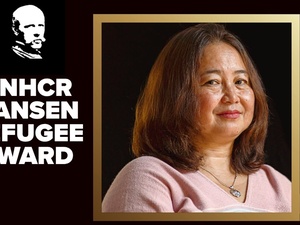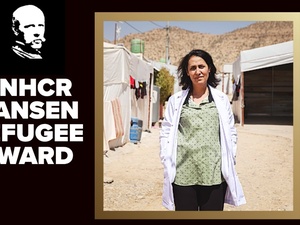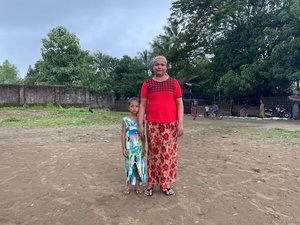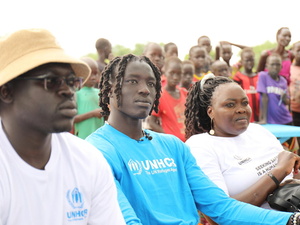South Sudanese man becomes "refugee" on his own doorstep
South Sudanese man becomes "refugee" on his own doorstep
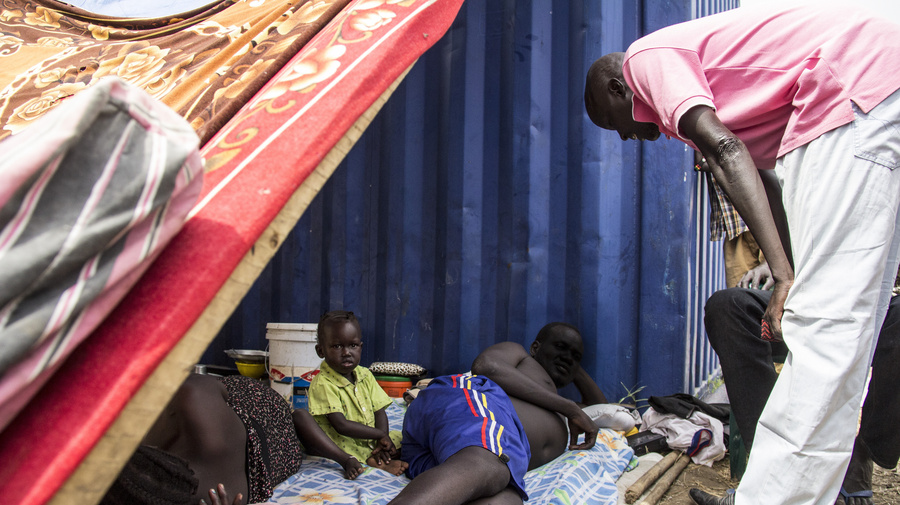
Chuol lies on a mattress in his family's makeshift shelter at the UN Mission in South Sudan base in Juba's Tong Ping area. His face has been obscured for protection reasons.
JUBA, South Sudan, January 2 (UNHCR) - Chuol lies on a foam mattress in a makeshift camp inside a UN compound, only four kilometres from his own home, nursing a bullet wound to his ankle.
"It's very painful," says the father of nine, here with 17 members of his extended family. "But what shall we do? If we go outside, people will kill me."
Chuol, 37, says he was wounded on December 15, the day violence broke out in South Sudan, the world's newest country. A market vendor, he and his family lived in the Gudele district, epicentre of the violence in South Sudan's capital, Juba.
Fighting has since spread to seven of the country's 10 states, displacing more than 180,000 people within the country. They include some 14,000 people who have set up a makeshift camp in the grounds of a UN Mission in South Sudan (UNMISS) military base in Juba's Tong Ping area.
Chuol says when gunfire broke out, he ran in one direction, his wife and children in another and his brother in yet a third. Unlike others in the makeshift camp in the Tong Ping base - mostly from the Nuer tribe and perceived to be supporters of former Vice President Riek Machar - Lam does not blame ethnic tension.
South Sudan's President Salva Kiir says Machar has launched a rebellion; other observers say a political struggle between the country's two top figures has descended into violence between the two largest tribes, the Dinka and the Nuer.
"They were shooting in my area, but I don't know why," says Chuol, adding that he thought the conflict would be confined to military forces, "but the fighting spread to civilians."
Someone took aim at him as he fled for the bush, and a bullet pierced his right ankle. He later managed to dig out the bullet, but says the bones were shattered. Pointing to his swollen ankle, Chuol says he believed he would be killed if he sought treatment in a government hospital.
So he sent his wife and children to seek sanctuary at Tong Ping and stayed behind because he could not walk. It was only four days later that some kind strangers came to his home with a car and brought him to the camp. Leaning on a stick, he hobbled from the entrance to where his wife had fashioned a lean-to for the family against a shipping container.
Fellow market vendors gave the family some cooking pots and the mattress on which Chuol now passes his days in pain. (After the interview, a UNHCR staff member referred him for medical treatment.)
UNMISS soldiers, in the country to protect civilians, suddenly found themselves host to some 14,000 unexpected guests. UNHCR and its partners have been working closely with the soldiers, helping acquaint them with humanitarian principles such as neutrality, and making sure the displaced people inside the compound are adequately protected.
The UN refugee agency and its partners are also working to identify children on their own, reunify them with their families if possible, and find them temporary living quarters in the meantime.
Inside the compound, businesses are popping up - a tiny market stall and kiosks for charging mobile phones - and after two weeks, a siege mentality is taking hold. "If we go outside to buy something, people can shoot," says Chuol.
Peter Trotter, UNHCR's senior protection officer in South Sudan, confirms that the refugee agency has received many credible reports of people being targeted for their ethnicity in Juba and in other parts of the country.
"The consistency and repetition of the stories leads us to believe they're true - combined with what we ourselves saw in the days after the conflict," says Trotter.
Chuol - who had never been a refugee during the 22-year north-south war that led to independence from Sudan in 2011 - certainly did not expect to be a refugee in all but name just an hour's walk from his own home.
But now, he says, his family has lost everything. When he emerged from the bush after the shooting stopped, he says he counted 17 bodies of friends and neighbours. He found his house had been stripped of furniture and all the family's clothes, the stock for his business looted.
After that trauma, his huge family does not expect to leave this makeshift camp any time soon. "What shall we do? We are all suffering," says Chuol. "We will stay here until God will show us the future."
By Kitty McKinsey in Juba, South Sudan




